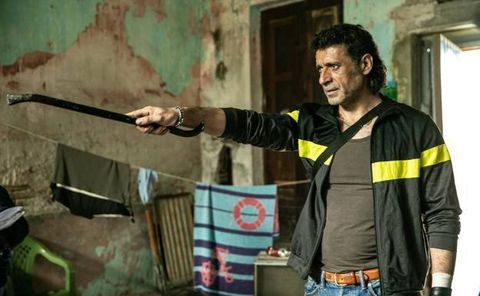
“Good villains make good thrillers,” the Master of Suspense is purported to have said.
And if a writer knows what’s good for her — or him — you name that bad guy “Falconetti.”
That name has turned up a couple of times since it was worn by the villain of U.S. TV’s “Rich Man, Poor Man,” never more memorably than Nacho Fresneda‘s sadistic turn in “The Silence of the Marshes (El silencio del pantano)”, an otherwise indifferent serial killer thriller set in Valencia.
He is the enforcer of Grandma’s (Carmina Barrios) mob, and a man tasked with a mission.
“Corruption is like Paella,” a newspaper headline screams. “Best done in Valencia.”
Co-opted cops, a high official (Maite Sandoval) tied to Grandma by blood and money, a scandal erupting because of what one man — “The Professor” (José Ángel Egido) knows, has already said in court and may elaborate on in future trials.
But when then mob-made academic — “Who knows more about money laundering than an economist?” — goes missing, it’s the pitiless Falconetti, a walking scar with a crowbar, tasked with tracking him down.
Ah, but “The Silence of the Marsh,” which takes its title from the swamps drained so that Valencia — on the Mediterranean coast — could be built, isn’t Falconetti’s story.
The person who knows what happened to “The Prof” is the guy who tased him and spirited him away to an old house on the marshes. “Q” (Pedro Alonso) is a popular novelist. He types away in his waterfront warehouse rental, conjuring up merciless revenge for minor offenses and vigilante murders that tidy up Valencia’s politics.
But the fellow is actually committing the crimes he’s writing about. That’s not the only conclusion we can draw from Marc Vigil’s film of the Juanjo Braulio novel. “Reality” and “the writer’s imagination” are blurred, all the way to the anti-climax.
And that’s not a burden this generally predictable serial killer thriller can carry. When everybody’s a villain, and the lead is rather blase, either in biker leather riding his Ducati or at the keyboard conjuring up crimes, it’s the brute who takes over the picture.
As Fresnada (of Spanish Netflix’s “The Ministry of Time”) pretty much does, the first time we meet him, setting fire to African drug dealers moving in on his turf.

The “hero’s” murders are routine. Falconetti gets the one shocking, show-stopping fight.
The writer’s voice-over is tepid, tired “killer-as-narrator” cliches. Falconetti is a man of fewer words.
There’s one funny line in the whole thing, which belongs to neither of the two leads, just a statement on Valencia corruption. Madame (party) Secretary (Sandoval) gripes to her cops when the scandal’s star witness, The Prof (who used to be in politics), disappears.
“We can’t allow politicians to disappear,” (in Spanish, with English subtitles, or dubbed). Uh, ma’am? We can’t allow ANYbody to disappear her minions remind her.
The story fails to adequately maintain the mystery — Is this real, or just in the writer’s head? And messing around with that “reality” as the closing credits are about to roll is just a cheat, and dumb to boot.
At least the real villain, the real menace of “The Silence of the Marsh,” gives us something to chew on while he’s chewing up his scenes.

MPAA Rating: TV-MA, graphic violence, drug abuse, profanity
Cast: Pedro Alonso, Nacho Fresnada, Carmina Barrios, José Ángel Egido and Maite Sandoval
Credits: Directed by Marc Vigil, script by Carlos de Pando and Sara Antuña, based on a novel by Juanjo Braulio. A Netflix release.
Running time: 1:32
